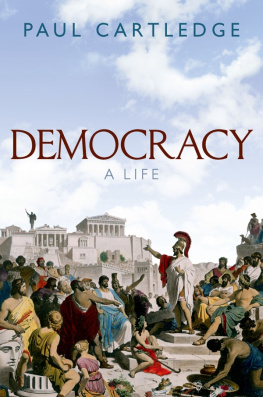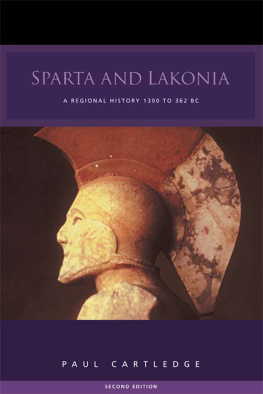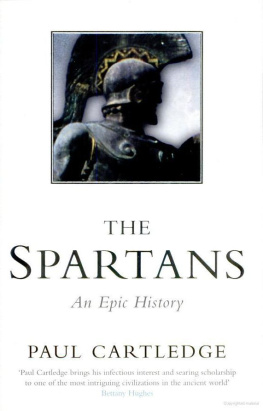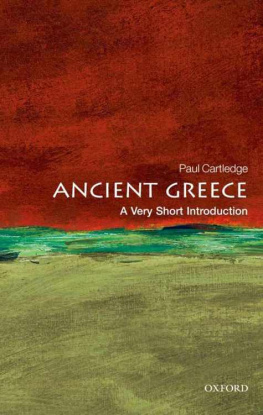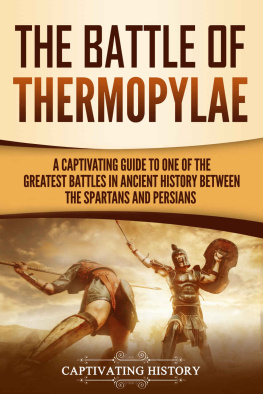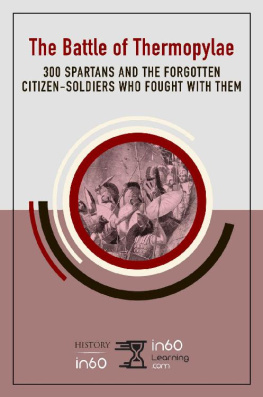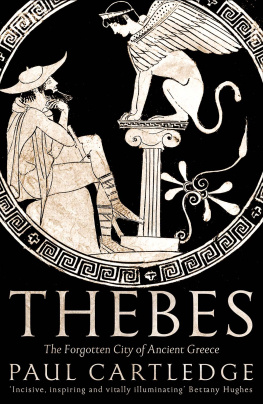Cartledge - After Thermopylae
Here you can read online Cartledge - After Thermopylae full text of the book (entire story) in english for free. Download pdf and epub, get meaning, cover and reviews about this ebook. City: USA, year: 2013, publisher: Oxford University Press, genre: Religion. Description of the work, (preface) as well as reviews are available. Best literature library LitArk.com created for fans of good reading and offers a wide selection of genres:
Romance novel
Science fiction
Adventure
Detective
Science
History
Home and family
Prose
Art
Politics
Computer
Non-fiction
Religion
Business
Children
Humor
Choose a favorite category and find really read worthwhile books. Enjoy immersion in the world of imagination, feel the emotions of the characters or learn something new for yourself, make an fascinating discovery.

After Thermopylae: summary, description and annotation
We offer to read an annotation, description, summary or preface (depends on what the author of the book "After Thermopylae" wrote himself). If you haven't found the necessary information about the book — write in the comments, we will try to find it.
After Thermopylae — read online for free the complete book (whole text) full work
Below is the text of the book, divided by pages. System saving the place of the last page read, allows you to conveniently read the book "After Thermopylae" online for free, without having to search again every time where you left off. Put a bookmark, and you can go to the page where you finished reading at any time.
Font size:
Interval:
Bookmark:
AFTER THERMOPYLAE
EMBLEMS OF ANTIQUITY
Font of Life
Ambrose, Augustine, and the Mystery of Baptism
GARRY WILLS
Medusas Gaze
The Extraordinary Journey of the Tazza Farnese
MARINA BELOZERSKAYA
The Throne of Adulis
Red Sea Wars on the Eve of Islam
G. W. BOWERSOCK
After Thermopylae
The Oath of Plataea and the End of the Graeco-Persian Wars
PAUL CARTLEDGE
THE OATH OF PLATAEA AND THE END OF THE GRAECO-PERSIAN WARS

PAUL CARTLEDGE


Oxford University Press is a department of the University of Oxford.
It furthers the Universitys objective of excellence in research,
scholarship, and education by publishing worldwide.
Oxford New York
Auckland Cape Town Dar es Salaam Hong Kong Karachi
Kuala Lumpur Madrid Melbourne Mexico City Nairobi
New Delhi Shanghai Taipei Toronto
With offices in
Argentina Austria Brazil Chile Czech Republic France Greece
Guatemala Hungary Italy Japan Poland Portugal Singapore
South Korea Switzerland Thailand Turkey Ukraine Vietnam
Oxford is a registered trade mark of Oxford University Press
in the UK and certain other countries.
Published in the United States of America by
Oxford University Press
198 Madison Avenue, New York, NY 10016
Oxford University Press 2013
All rights reserved. No part of this publication may be reproduced,
stored in a retrieval system, or transmitted, in any form or by any means, without the
prior permission in writing of Oxford University Press, or as expressly permitted by law,
by license, or under terms agreed with the appropriate reproduction rights organization.
Inquiries concerning reproduction outside the scope of the above should be sent
to the Rights Department, Oxford University Press, at the address above.
You must not circulate this work in any other form
and you must impose this same condition on any acquirer.
Library of Congress Cataloging-in-Publication Data
Cartledge, Paul.
After Thermopylae : the oath of Plataea and the end of the
Graeco-Persian Wars / Paul Cartledge.
pages cm.(Emblems of antiquity)
Includes bibliographical references and index.
ISBN 978-0-19-974732-0
1. Plataea, Battle of, Plataiai, Greece, 479 B.C . I. Title.
DF225.7.C37 2013
938.03dc23 2013010296
1 3 5 7 9 8 6 4 2
Printed in the United States of America
on acid-free paper
To the memory of John David Lewis (19552012)
Chapter One
INTRODUCTION: ARMS AND THE MEN
Chapter Two
THE OATH OF PLATAEA: TEXTS AND CONTEXTS
Chapter Three
THE PLATAEA OATH AS A DOCUMENT OF ANCIENT GREEK RELIGION
Chapter Four
THE PERSIAN WARS: MAKING HISTORY ON OATH WITH HERODOTUS
Chapter Five
THE FACE OF THE BATTLE OF PLATAEA
Chapter Six
THE GREEKS INVENT THE PERSIAN WARS: THE MYTHOLOGY AND COMMEMORATION OF PLATAEA
Chapter Seven
CONCLUSION: THE LEGACY OF PLATAEA
The Persian Wars, as they are widely known, because typically they are looked at from a Greek viewpoint, are famous enough not to need any special attention. The names of Marathon, Thermopylae, and Salamis are as celebrated in their way as those of Hastings, Blenheim, and Waterloo in the annals of English (or British) military history. Indeed, the classically educated Victorian political philosopher and activist John Stuart Mill was once famously moved to claim that Marathon was more important than Hastings, even as an event in English history! That claim may seem extraordinary, almost outlandish, but it chimed with his high-Victorian readerships view that the ancient Greeks and especially the ancient Athenians were their cultural ancestors, and that there was at least an imagined continuum between the Greeks fifth-century BCE culture and that of the English or British in the nineteenth century CE .
But memory of the Persian Wars was also then, as it often still is, highly selective. Will Cinderellathe Battle of Plataeabe allowed to go to this ball? Not always, nor indeed very often. If the ancient Persian empire could quite recently be calledor mislabeledthe forgotten empire (in an important exhibition held at the British Museum), how much more deservedly is the epithet forgotten to be attached, ironically enough, to the Battle of Plataea, the land battle that actually decided the Persian Wars. Giles MacDonoghs Great Battles. 50 Key Battles from the Ancient World to the Present Day (2010) is just one of the most recent such compilationsor rather selectionsknown to me that manages to include Thermopylae and Salamis but yet to exclude Plataea. Going back three-quarters of a century, we find that Compton Mackenzies brief but sharp essay of 1934 subtitled The Battles that Defined the Western World is significantly and typically entitled Marathon & Salamis, not, as of course it should have been, Marathon, Salamis & Plataea. But at least Mackenzie did have the proper decency to acknowledge in his text that it was Plataea, and not either of his two titular battles, that was the decisive battle (). Sadly, the register of long oblivion could easily be extended back in time, as far indeed as Mill and beyond.
It was therefore with alacrity that I accepted the challenge thrown down to me by the Oxford University Press (New York) to contribute to their new Emblems of Antiquity series with a book paying due homage to the Battle of Plataea as a key and pivotal moment not just in ancient or classical Greek history but in all Western history. This book, like the series as a whole, is the brainchild of the ever-inventive Stefan Vranka, and it has been a pleasure as well as a stimulating learning experience to work, again, with him and his colleagues in New York. In accordance with the aims and objectives of the series, this book is addressed to a wide general readership, but yet it has some academic scaffolding and infrastructure too, and through its Epameinondas-like (oblique, slantwise) manner of approach to the battle via the Oath of Plataea (rather than more head-on, via the so-called Serpent Column victory monument, say) it is hoped that some new or newer light may be shed on the topic in general, and not just for general readers but even perhaps for some of my ancient historian colleagues in the field too.
The position I held from 2006 to 2010 of (visiting) Global Distinguished Professor in the excellent Department of Classics at New York University greatly facilitated the negotiations leading to the contracting of the book. At N.Y.U. I have also to thank most warmly President John Sexton, former Deans Dick Foley and Matthew Santirocco, Associate Dean Jonathan Friedman, and colleagues in the Classics Departmenttoo many to name them all, though I absolutely must name Phillip Mitsis, Joan Connelly, and Mike Peachin. Likewise, various collaborations with the marvelous Director of the NYC-based Onassis Cultural Foundation (USA), Ambassador Loukas Tsilas, and his right-hand woman Amalia Cosmetatou have been both a constant encouragement and a constant reminder that it was a key part of my N.Y.U. Global Distinguished Professorship remit to reach out to the Hellenic community in New York City and environs. For their unstinting
Next pageFont size:
Interval:
Bookmark:
Similar books «After Thermopylae»
Look at similar books to After Thermopylae. We have selected literature similar in name and meaning in the hope of providing readers with more options to find new, interesting, not yet read works.
Discussion, reviews of the book After Thermopylae and just readers' own opinions. Leave your comments, write what you think about the work, its meaning or the main characters. Specify what exactly you liked and what you didn't like, and why you think so.


